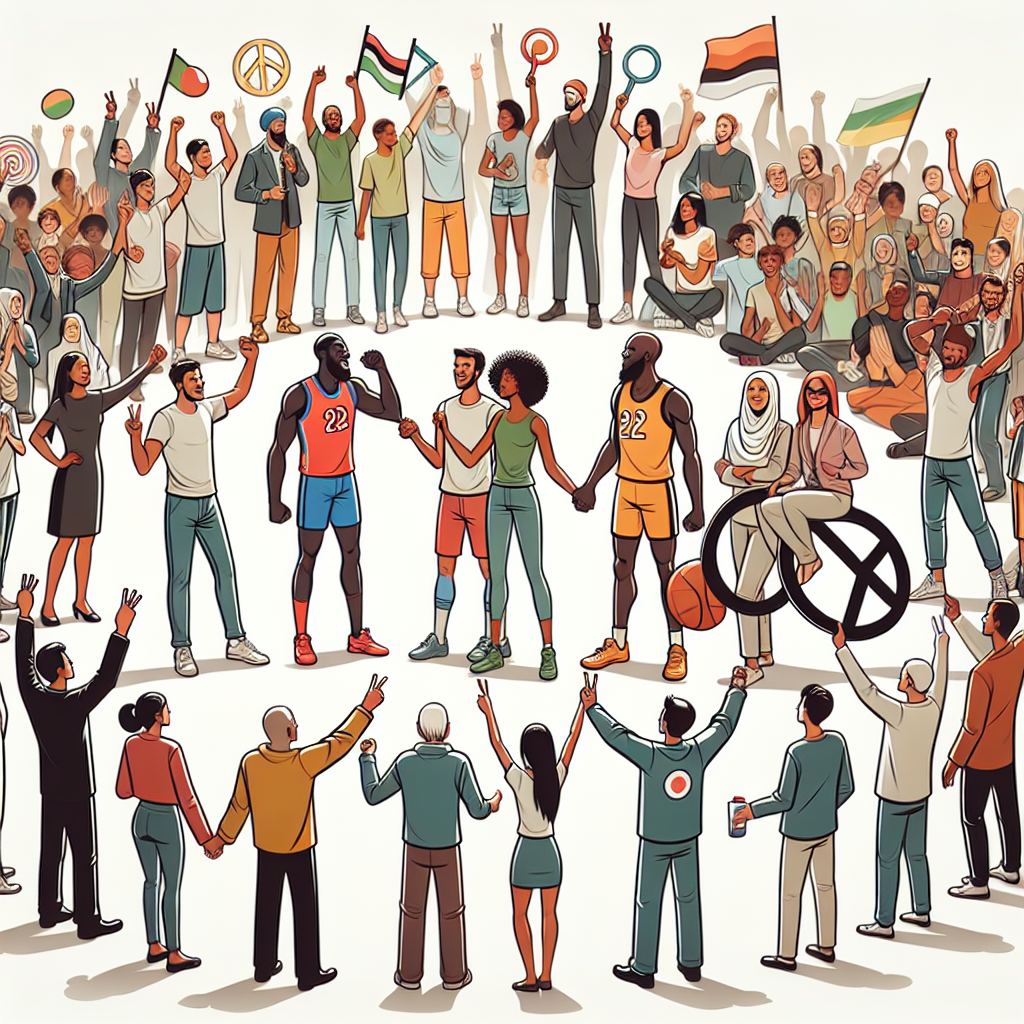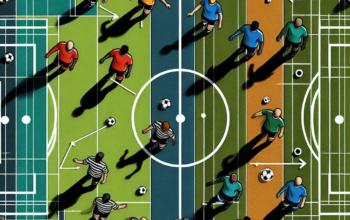Highlighting the Success of Athletes in Social Activism
In recent years, the intersection of sports and social activism has gained tremendous traction, as athletes increasingly use their platforms to advocate for social change. This movement has not only transformed public perceptions of athletes but also highlighted their role as influencers beyond the realm of sports. As we delve into the successes of these athletes, we can see that their impact extends far beyond the playing field, driving discussions on critical issues like racial equality, mental health awareness, and climate change.
The journey of athlete activism is rich and multifaceted, with figures from various sports embracing their roles as advocates for justice and change. In 2025, athletes continue to lead by example, showcasing their commitment to making a difference in their communities and the world at large. This article examines the success of athletes in social activism, emphasizing their significant contributions and the positive outcomes of their efforts.
The Rise of Athlete Activism
The rise of athlete activism can be traced back to historical moments in sports when athletes have taken a stand against social injustices. From the powerful protest of Tommie Smith and John Carlos at the 1968 Olympics to Muhammad Ali’s stand against the Vietnam War, these actions paved the way for a new generation of athlete-activists. By 2025, this legacy continues to resonate, inspiring current athletes to leverage their fame and influence for advocacy.
In recent years, we have seen a notable increase in athletes speaking out on pressing social issues. For instance, the Black Lives Matter movement gained momentum in 2020, compelling many athletes to use their platforms to combat systemic racism. Prominent figures like LeBron James and Serena Williams have been at the forefront, using social media and public appearances to spread awareness and encourage dialogue on racial inequalities. This wave of activism is not only reshaping how athletes are perceived but also how they view their roles in society.
Social Media: A Game-Changer for Activism
In 2025, the role of social media in athlete activism cannot be underestimated. Platforms like Twitter, Instagram, and TikTok serve as powerful tools for athletes to communicate their messages directly to their audiences. The immediacy of social media allows athletes to mobilize their fans and create real-time discussions around social issues. For example, NBA players have used social media to raise awareness about police violence and advocate for legislative changes.
Moreover, the rise of digital activism has democratized the landscape, enabling not just superstars but also lesser-known athletes to contribute to social causes. With just a tweet or a post, athletes can reach millions, sparking movements and fundraising efforts that might have taken years to organize in a pre-digital age. This evolution signifies a shift in how activism is conducted, with athletes taking ownership of their narratives and pushing for change from the ground up.
Notable Athlete Activists in 2025
In 2025, various athletes stand out for their exemplary activism, each addressing myriad issues with a unique perspective. For instance, Naomi Osaka has become a beacon for mental health awareness in sports. Her openness about her own struggles with anxiety and depression during high-pressure tournaments has encouraged many others to seek help and support. Osaka’s advocacy has prompted discussions about the importance of mental health in sports, leading to greater institutional attention and resources for athletes facing similar challenges.
Another notable figure is Colin Kaepernick, whose initial protest against racial injustice continues to inspire athletes in various sports. In 2025, Kaepernick’s Legacy Foundation has funded numerous scholarships for underserved youth, emphasizing education and empowerment. His commitment to social justice has sparked a movement within the NFL and beyond, urging athletes to use their voices and actions to promote equity and representation in sports and society.
Additionally, soccer players like Marcus Rashford have taken significant strides in advocating for children’s rights and combating food poverty in the UK. His successful campaign to ensure free school meals for underprivileged children during the COVID-19 pandemic showcased the potential of athlete activism to effect profound change. Rashford’s commitment has created a lasting impact in his community, serving as an inspiration for future athlete-activists who wish to fight for social change.
The Impact of Athlete-Led Nonprofits
As athlete activism evolves, many prominent athletes have established their own nonprofit organizations to formalize their commitment to social causes. These initiatives not only provide a structured approach to advocacy but also create sustainable programs and resources for communities in need. For instance, the LeBron James Family Foundation has been instrumental in establishing the I PROMISE School, which focuses on at-risk youth in Akron, Ohio, offering them a supportive educational environment.
In 2025, more athletes are taking similar paths, recognizing that their influence can generate lasting change through dedicated organizations. Such charities focus on diverse issues, from education and healthcare to environmental sustainability. By embedding their activism in nonprofit frameworks, athletes can rally support, secure funding, and ensure that their initiatives have a long-term impact.
Moreover, the rise of collaborative efforts among athletes and their foundations has further amplified their influence. Joint initiatives, such as the Athletes for Equality project, have united athletes across various sports to address pressing social issues collectively. This collaboration not only amplifies their messages but also fosters a sense of solidarity among athletes in the fight for justice.
The Legacy of Athlete Activism: Challenges and Future Directions
Despite the successes achieved thus far, athlete activism faces challenges that must be addressed to ensure its sustainability. Critics often argue that athletes should “stick to sports” and avoid engaging in political matters. This sentiment persists in some circles, potentially discouraging athletes from advocating for change. However, as society increasingly recognizes the importance of social responsibility, these challenges are being met with resistance from both fans and fellow athletes alike.
Looking forward to 2025 and beyond, the future of athlete activism appears promising. With a new generation of athletes passionate about social justice, we can expect to see continued momentum and evolution in the movement. The focus on climate change, gender equality, and health initiatives is gaining traction, as athletes recognize the interconnectedness of these issues. By broadening their platforms to include a diverse range of causes, athletes can ignite greater awareness and strengthen their messages.
In addition, educational programs aimed at empowering athletes with information on social issues and activism can enhance their impact. By providing athletes with resources and training, sports organizations can create a culture that encourages involvement in activism from the grassroots level up. This approach not only benefits the athletes but also fosters a generation of socially responsible individuals in the sports industry.
Conclusion
In the ever-evolving landscape of sports and society, athletes have demonstrated their capacity to influence significant social change. The successes of various athlete-activists, their utilization of social media platforms, the creation of impactful nonprofits, and the challenges they face only underscore the importance of their activism in today’s world. As we look toward the future, the legacy of athletes as champions of social justice is set to grow, creating a legacy that transcends the realm of sports and inspires generations to come.
FAQs
What is athlete activism?
Athlete activism refers to the actions taken by professional athletes to advocate for social change, using their platforms and influence to address issues such as racial inequality, mental health, and environmental sustainability.
Why is social media important for athlete activism?
Social media provides athletes with the ability to reach a vast audience quickly, allowing them to mobilize support, raise awareness, and create real-time dialogues around pressing social issues.
How do athlete-led nonprofits contribute to social change?
Athlete-led nonprofits provide structured approaches to advocacy, creating sustainable programs and resources that directly address the needs of communities, thereby generating lasting impacts in areas such as education, health, and social justice.






